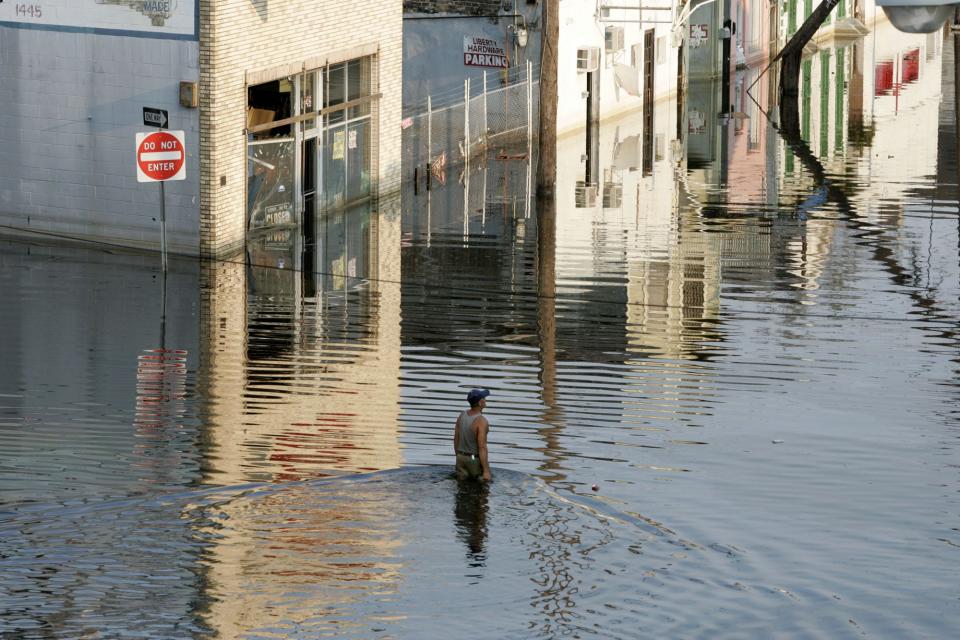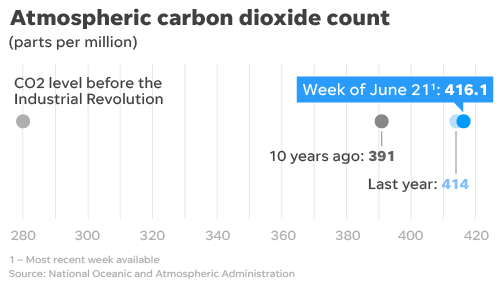Climate Point: Not to be alarmist, but is your house in a flood zone?
Welcome to Climate Point, your weekly guide to climate, energy and environment news from around the Golden State and the country. In Palm Springs, Calif., I’m Mark Olalde.
Let's start with a new investigative project from USA Today, in partnership with nonprofit First Street Foundation, that digs into the question of all-important flood maps and the insurance that relies on them. It turns out, many maps haven't been updated in years, leaving 6 million homes and commercial properties potentially unprepared for the floods that are only worsening as weather becomes increasingly severe.
Take a look to see how your community compares. And now, let's get to some other important reporting...

MUST-READ STORIES
The Democrats have a plan. Say what you will about how Democrats' talk on climate change compares to their action, but they finally published their long-awaited plan to address the issue and to phase out new emissions by 2050, The Guardian reports. Dave Roberts of Vox took a deep dive into what the plan means, comparing it to Republicans' refusal to seriously address the issue.
The dominoes are falling. As the coronavirus-fueled economic slowdown exposed the over-leveraged nature of shale gas, it became inevitable that bankruptcies would follow. Now a major player, Chesapeake Energy, has fallen, which could be a harbinger for what faces the rest of the industry. Its downfall could've been tied in part to greed — CNBC uncovers its hidden wine cave, beekeepers and botox treatments — but its industry is also just downright unprofitable. Forbes has those details.
We appear to be close to enforcing laws. The EPA announced in late March that it would halt large swathes of its enforcement during the coronavirus pandemic. This sparked an immediate outcry but proved to be just a preview of the federal deregulatory agenda the Trump administration laid out during the public health crisis. Bloomberg reports that the EPA recently announced it will return to doing its job at the beginning of September in response to the country reopening.
The resource curse strikes again. In a horrifying new story, Bloomberg takes us into the Niger Delta, specifically 27,000 acres that have been turned into a toxic muck by decades of oil spills caused by Shell, Chevron and others. Nigeria is dependent on the industry but faces cleanup that would take many billions of dollars that aren't there.
POLITICAL CLIMATE
Missed potential. The United States-Mexico-Canada Agreement — Trump's NAFTA — went into effect on Wednesday, and it's not a win for the environment, Martha Pskowski writes in DeSmogBlog. The new deal guarantees the "free flow of energy" across borders, strengthens markets for natural gas, lifts tariffs on tar sands and "misses an opportunity to push both the U.S. and Mexico to act on the climate crisis."
The Emerald Isle goes green. Ireland recently came to an agreement for a new, three-party coalition that comes with an "extremely ambitious" climate plan to push it to the forefront of the European Union. The coalition's negotiations landed on two key environmental priorities: pass a law within 100 days to set a net-zero emissions target by 2050 and go green via the economic recovery post-coronavirus. Climate Home News has the story.
Tree politics. Here in the Southwestern desert, political haggling is underway over the response to climate change. California is considering listing the gangly-but-beloved Joshua tree — as I describe it in this scoop for The Desert Sun — as endangered, which could make it the first species protected under state law with climate change as the main threat. But, a newly amended bill takes aim at the potential listing, with the author arguing this interpretation might go too far in hampering development.
RENEWABLES ARE HAVING A WEEK
Fiduciary doesn't mean fossil fuel. S&P Global Market Intelligence reports on a new study out this week that analyzed more than 2,500 coal-fired power plants and found renewable energy is simply cheaper. For nearly 40% of global coal capacity that's currently operational, it's cheaper not just to operate solar or wind power but to actually build brand new panels and turbines from the ground up.
Under African skies. One in two people who will be born over the next decade will be born in Africa. Bringing widespread electricity access to the continent will have wide-ranging effects, the executive director of the International Energy Agency and the minister of petroleum and energy for Senegal write in The Africa Report. Studies have shown that the continent has vast, largely untapped renewable energy potential, which could be used to lift African nations out of poverty while protecting health and the environment.
George Washington is done with hydrocarbons. At the center of the Western world, in downtown Washington, D.C., George Washington University announced this week that it will divest its endowment from fossil fuels. The politically important institution is now the latest university to do so, WTOP reports, following the likes of the University of California system.
AND ANOTHER THING

Where there's a different set of laws. The Trump administration is hard at work fulfilling its campaign promise to finish building barricades along the southwestern border. In the process, the federal government has been able to waive laws, eliminate wildlife corridors used by jaguars and bulldoze rivers. Recently, the legal superiority of border security was entrenched by the Supreme Court, as the justices declined to hear a challenge brought on environmental grounds against the border fence. Reuters has the news.
Scientists agree that to maintain a livable planet, we need to reduce the atmospheric carbon dioxide concentration back to 350 ppm. We’re above that and rising dangerously. Here are the latest numbers:

That’s all for now. Don’t forget to follow along on Twitter at @MarkOlalde. You can also reach me at molalde@gannett.com. You can sign up to get Climate Point in your inbox for free here. And, if you’d like to receive a daily round-up of California news (also for free!), you can sign up for USA Today’s In California newsletter here. Wear your masks, and please don't party within six feet of anyone this Fourth of July weekend. Cheers.
This article originally appeared on USA TODAY: Climate Point: Not to be alarmist, but is your house in a flood zone?

